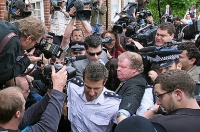Every day, we ink-stained wretches shove our noses all into church’s business, reporting frequently on their failures, and occasionally on their successes. Is it only fair, then, when a church hires journalists to investigate a newspaper?
The Washington Post’s Howard Kurtz reported on Monday that the Church of Scientology has hired three prize-winning journalist to go sleuthing on the St. Petersburg Times after the paper published a scathing multi-part series on the religion’s leaders last summer. The Times, which won a Pulitzer Prize for its coverage of Scientology in 1980, has long feuded with church leaders.
Neil Brown, the Times’ executive editor, said his paper was asked to cooperate with the study but “couldn’t take this request very seriously because its a study bought and paid for by the Church of Scientology.”
Brown also said that he’s “surprised and disappointed that journalists who I understand to have an extensive background in investigative reporting would think it’s appropriate to ask me or our news organization to talk about that reporting while (a) it’s ongoing, and (b) while they’re being paid to ask these questions by the very subjects of our reporting.”
One of the journalists, Steve Weinberg, who has taught at the Missouri School of Journalism for 25 years and is a former executive director of Investigative Reporters and Editors, told Kurtz, “For me it’s kind of like editing a Columbia Journalism Review piece.” He said the Church paid him $5,000 “and I can certainly use the money these days.”
Weinberg used to sing a slightly different tune, commenting on the True/Slant Web site in 2009 that “More than any other existing organization that comes to mind, the Scientologists have been so hostile to outside journalists that I cannot see crossing the line to accept employment there.”
The Columbia Journalism Review, for its part, is none too happy with Weinberg’s comparison, saying “we’re sorry Steve invoked our name.”
The Review also said, “The quality of this effort is not the point as much as the fact of this effort — hiring on to help an entity notorious for bringing terrible pressure on any journalist who dares to examine it. While the pay is likely meaningful to the journalists, and we know that times are hard, it is chump change to the Church. The Church can essentially gamble that these veteran journalists will find something of value that it can use as a weapon against the Times.”
The other reporters hired by the Church, Russell Carollo, who won a 1998 Pulitzer for Dayton, Ohio’s Daily News and Christopher Szechenyi, an Emmy-winning former television producer, said in a joint statement: “We were hesitant. That’s why we insisted on being paid in full before we started our work, total editorial independence and having someone with the reputation of Steve Weinberg involved…”
Scientology spokesman Tommy Davis said the 20-page report was commissioned because “we wanted to get an outside view”; the report may, or may not, be published. Davis said the church plans to continue scrutinizing the Times, as it has done for a long time.
Meanwhile, will the Times’ report garner the paper its second Pulitzer for Scientology coverage?





